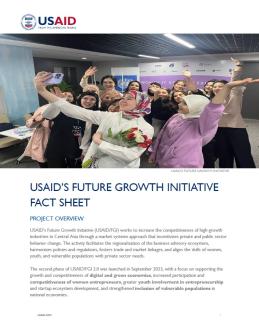PROJECT OVERVIEW
USAID's Future Growth Initiative (USAID/FGI) works to increase the competitiveness of high-growth industries in Central Asia through a market systems approach that incentivizes private and public sector behavior change. The activity facilitates the regionalization of the business advisory ecosystem, harmonizes policies and regulations, fosters trade and market linkages, and aligns the skills of women, youth, and vulnerable populations with private sector needs.
The second phase of USAID/FGI 2.0 was launched in September 2023, with a focus on supporting the growth and competitiveness of digital and green economies, increased participation and competitiveness of women entrepreneurs, greater youth involvement in entrepreneurship and startup ecosystem development, and strengthened inclusion of vulnerable populations in national economies.
PRIORITIES
Digital Economy – USAID/FGI 2.0 offers micro, small and medium-sized enterprises (MSMEs) opportunities to improve their competitiveness and market access by tapping into larger global markets, enhancing customer engagement, streamlining operations, and driving innovation. USAID/FGI 2.0 works with MSMEs to enhance capacity and expand future growth opportunities.
Green Economy – USAID/FGI 2.0 helps shift economies towards low-carbon, resource-efficient, and socially inclusive pathways to growth, supporting investments in renewable energy and sustainable manufacturing and business processes. USAID/FGI 2.0 supports mechanisms that unlock opportunities for innovation, job creation, and community resilience.
Gender Equity and Social Inclusion – USAID/FGI 2.0 actively supports women, youth, and vulnerable groups to mitigate challenges that strain private sector growth and inclusion. It promotes social entrepreneurship, economic inclusion, and enhanced business opportunities to facilitate the active economic engagement of these groups.
ANTICIPATED RESULTS
The initiative aims to create more inclusive and sustainable markets in Central Asia by increasing private sector investment and strengthening market competitiveness. It focuses on building the technical and business capacities of companies and entrepreneurs, especially women, youth, and vulnerable groups, fostering an environment where diverse groups can thrive.
The program also seeks to build a more inclusive governance structure, dismantling barriers to growth for marginalized groups. By strengthening trade linkages, improving business connectivity, and fostering public-private dialogue, the initiative addresses challenges to development, trade, and growth. Additionally, it will empower partner governments to remove barriers in emerging sectors, ultimately creating a more vibrant and interconnected economic landscape in the region.
USAID/FGI 2.0 will empower 100 SMEs, boost the economic participation of 100 firms, and guide 50 companies in obtaining international certifications. The initiative ensures inclusivity, with 50% of participants being women, 30% youth, and 5% from other vulnerable groups.
The project aims to leverage $20 million in private sector resources, help 50 enterprises secure financing, and achieve a 60% sales increase among participants. Additionally, FGI 2.0 will support 50 companies in exporting and advocate for adopting seven essential laws, policies, or standards to drive economic growth and inclusivity.
USAID/FGI 2.0 ceiling: $18 million
Activity duration: September 2023 – September 2026
Contact: Anar Yesdauletova, Project Management Specialist, Economic Development Office, USAID/Central Asia; ayesdauletova@usaid.gov
New jobs created: 7.4K
Jobs improved: 14.11K
Trained individuals: 14.82K
Facilitated investment: 91.57M
Events: 1.1K
Laws improved: 17


